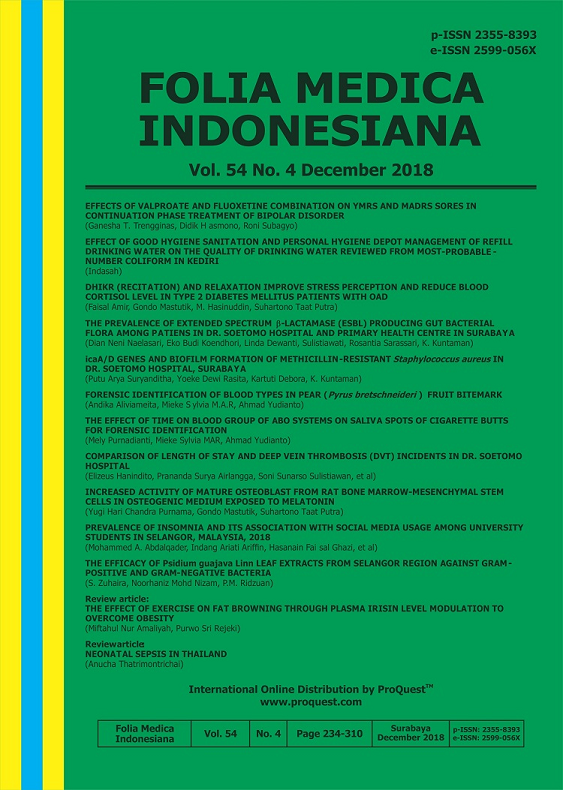Main Article Content
Abstract
Keywords
Article Details
-
Folia Medica Indonesiana is a scientific peer-reviewed article which freely available to be accessed, downloaded, and used for research purposes. Folia Medica Indonesiana (p-ISSN: 2541-1012; e-ISSN: 2528-2018) is licensed under a Creative Commons Attribution 4.0 International License. Manuscripts submitted to Folia Medica Indonesiana are published under the terms of the Creative Commons License. The terms of the license are:
Attribution ” You must give appropriate credit, provide a link to the license, and indicate if changes were made. You may do so in any reasonable manner, but not in any way that suggests the licensor endorses you or your use.
NonCommercial ” You may not use the material for commercial purposes.
ShareAlike ” If you remix, transform, or build upon the material, you must distribute your contributions under the same license as the original.
No additional restrictions ” You may not apply legal terms or technological measures that legally restrict others from doing anything the license permits.
You are free to :
Share ” copy and redistribute the material in any medium or format.
Adapt ” remix, transform, and build upon the material.

References
- Arikunto, Suharsimi.2010. Prosedur Penelitian:Rineka Cipta Hidayat,Alimul Aziz A. 2011.Riset Keperawatan Dan Penulisan Ilmiah. Jakarta: EGC.
- Athena, dkk. 2006. Pengertian Air Minum Kemasan. Jakarta; EGC.
- B. Kozier, Erb. 2009. Buku Ajar Praktik Keprawatan Klinis: ed 5. Jakarta: EGC.
- Depkes RI, 2006. Pedoman Pelaksanaan Penyelenggaraan Hygiene Sanitasi Depot Air Minum. Jakarta : Dirjen PPL.
- Hidayat,alimul aziz A.2011.Riset keperawatan dan penulisan ilmiah.jakarta:EGC.
- Indonesia, DepKes, 1997,Peraturan Menteri Kesehatan republik Indonesia Nomor 416/Menkes/PER/IX/1997 tentang Syarat-Syarat Dan Pengawasan Kualitas Air, Jakarta:Departemen Kesehatan Republik Indonesia.
- ............,2001,Peraturan Pemerintah Republik Indonesia Nomor 82 Tahun 2001 Tentang Pengelolaan Pencemaran Air Dan Pengendalian Pencemaran Air, Jakarta:Departemen Kesehatan Republik Indonesia.
- .............,2002, Keputusan menteri kesehatan republik Indonesia nomor 907/menkes/sk/vii/2002 tentang syarat-syarat dan pengawasan kualitas air minum, Jakarta:Departemen Kesehatan Republik Indonesia. Depkes RI, 2006. Pedoman Pelaksanaan Penyelenggaraan Hygiene Sanitasi Depot Air Minum. Jakarta : Dirjen PPL.
- Notoatmodjo.2010.Metodologi Penelitian Kesehatan. Jakarta: Rineka Cipta
- Nursalam.2011.pedoman skripsi.jakarta:salemba medika
- .............,2006. Konsep dan metodologi penelitian ilmu keperawatan. Surabaya : Salemba Medika.
- Ridwan.2012. Metode Dan Teknik Menyusun Proposal Penelitian. Bandung : Alfabeta.
- Sugiyono.2013. Metode Kuantitatif Dan Kuantitatif. Bandung: Alfabeta
- Sujudi.2006. Keputusan Menteri Kesehatan Republik Indonesia nomor 907/menkes/SK/vII/2006. Jakarta : Menkes RI
- Timmerck, T. 2005. Epidemiologi Suatu Pengantar. Jakarta : Penerbit Buku Kedokteran EGC.
- Wahyulesmono. 2008. Depot air minum. http://wahyulesmana.wordpress.com
References
Arikunto, Suharsimi.2010. Prosedur Penelitian:Rineka Cipta Hidayat,Alimul Aziz A. 2011.Riset Keperawatan Dan Penulisan Ilmiah. Jakarta: EGC.
Athena, dkk. 2006. Pengertian Air Minum Kemasan. Jakarta; EGC.
B. Kozier, Erb. 2009. Buku Ajar Praktik Keprawatan Klinis: ed 5. Jakarta: EGC.
Depkes RI, 2006. Pedoman Pelaksanaan Penyelenggaraan Hygiene Sanitasi Depot Air Minum. Jakarta : Dirjen PPL.
Hidayat,alimul aziz A.2011.Riset keperawatan dan penulisan ilmiah.jakarta:EGC.
Indonesia, DepKes, 1997,Peraturan Menteri Kesehatan republik Indonesia Nomor 416/Menkes/PER/IX/1997 tentang Syarat-Syarat Dan Pengawasan Kualitas Air, Jakarta:Departemen Kesehatan Republik Indonesia.
............,2001,Peraturan Pemerintah Republik Indonesia Nomor 82 Tahun 2001 Tentang Pengelolaan Pencemaran Air Dan Pengendalian Pencemaran Air, Jakarta:Departemen Kesehatan Republik Indonesia.
.............,2002, Keputusan menteri kesehatan republik Indonesia nomor 907/menkes/sk/vii/2002 tentang syarat-syarat dan pengawasan kualitas air minum, Jakarta:Departemen Kesehatan Republik Indonesia. Depkes RI, 2006. Pedoman Pelaksanaan Penyelenggaraan Hygiene Sanitasi Depot Air Minum. Jakarta : Dirjen PPL.
Notoatmodjo.2010.Metodologi Penelitian Kesehatan. Jakarta: Rineka Cipta
Nursalam.2011.pedoman skripsi.jakarta:salemba medika
.............,2006. Konsep dan metodologi penelitian ilmu keperawatan. Surabaya : Salemba Medika.
Ridwan.2012. Metode Dan Teknik Menyusun Proposal Penelitian. Bandung : Alfabeta.
Sugiyono.2013. Metode Kuantitatif Dan Kuantitatif. Bandung: Alfabeta
Sujudi.2006. Keputusan Menteri Kesehatan Republik Indonesia nomor 907/menkes/SK/vII/2006. Jakarta : Menkes RI
Timmerck, T. 2005. Epidemiologi Suatu Pengantar. Jakarta : Penerbit Buku Kedokteran EGC.
Wahyulesmono. 2008. Depot air minum. http://wahyulesmana.wordpress.com

